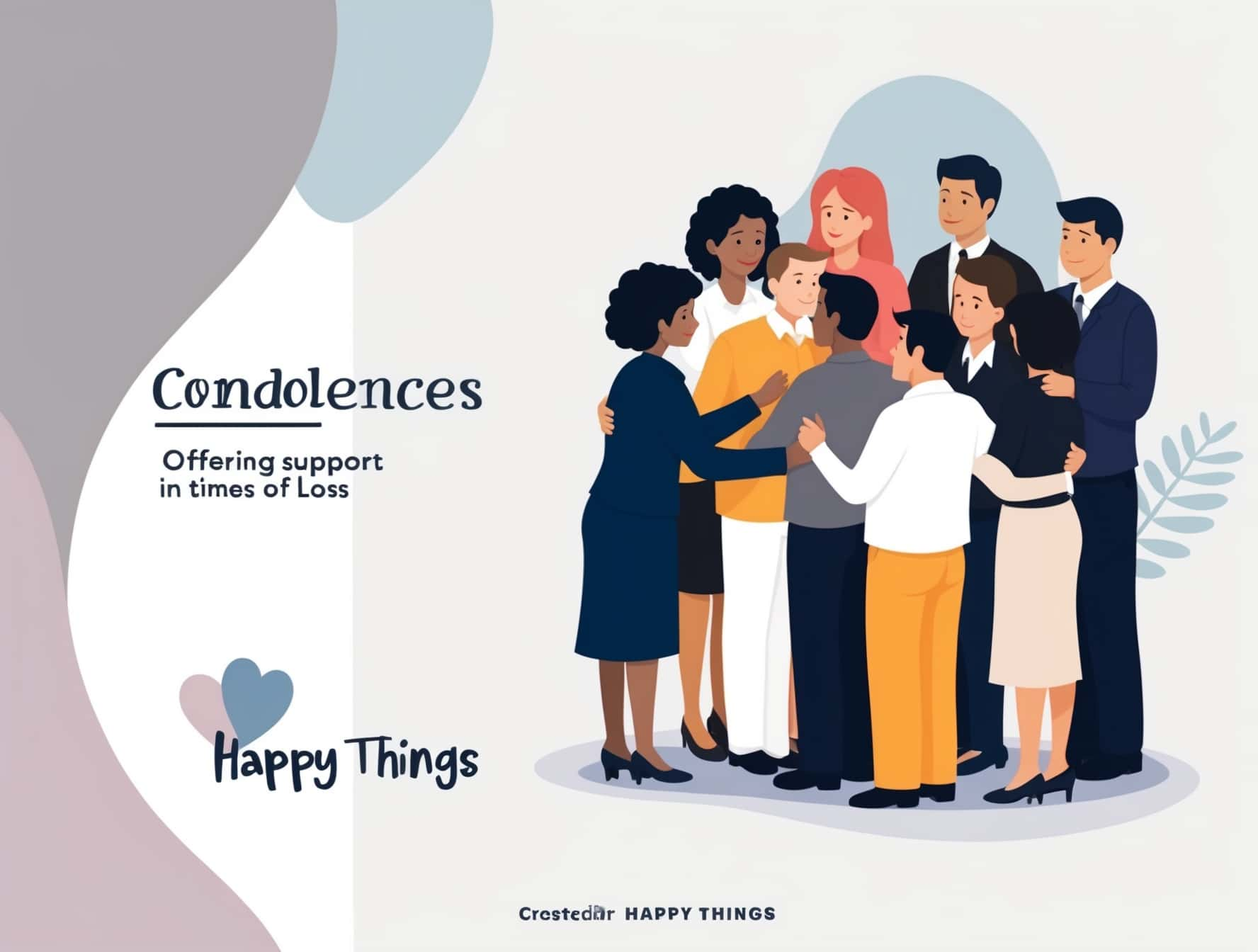When crafting Coworker Condolences Messages, focus on empathy and kindness. Acknowledge the grief and offer assistance. For example, “If you need anything or just want to talk, I’m here.” Keep it respectful and thoughtful, offering support in a professional but personal way.
Losing a loved one or going through a personal crisis can deeply impact a person’s emotional well-being, making support from coworkers all the more important. In a professional setting, coworker condolences messages offer a way to show empathy and provide comfort during difficult times.
These messages help maintain a compassionate workplace culture, where colleagues are not just seen as employees, but as individuals who deserve understanding and care. Offering heartfelt condolences also strengthens professional relationships by fostering a sense of community and mutual respect. Crafting the right message requires balancing sensitivity with professionalism, acknowledging the loss without crossing personal boundaries.
Sympathy Messages for the Loss of a Coworker
Losing a coworker is often a deeply saddening experience that affects everyone in the workplace. In these moments, expressing condolences for the passing of a colleague can help create a supportive and empathetic environment. Below are several messages you can consider for offering your sympathy during such a difficult time:
- I was deeply saddened to hear of [Name]‘s passing. Please know that my thoughts are with you and your team during this time of loss.
- Losing a colleague like [Name] leaves a gap that will be felt by all of us. My deepest condolences to you and the entire team.
- It’s hard to find the right words during such a time, but please know you have my heartfelt sympathy. [Name] will be missed by many.
- I am truly sorry for your loss. [Name] was an incredible colleague, and their presence in the office will be greatly missed.
- May you find strength in the cherished memories you have of [Name]. My condolences to you and your family.
- Please accept my deepest sympathy. [Name] was a remarkable individual, and their legacy will live on in the work we do.
- I can’t begin to imagine what you’re going through, but please know I’m thinking of you and wishing you peace during this challenging time.
- My heart goes out to you and the team as we mourn the loss of [Name]. Please let me know if there’s anything I can do to support you.
- [Name] was an inspiration to all of us, and their absence will be felt deeply. I’m so sorry for your loss.
- I was shocked and saddened to hear about [Name]. You and your team are in my thoughts during this painful time.
- Words cannot express how sorry I am for your loss. [Name] was a true asset to our team, and they will always be remembered.
- [Name] was a person of great character, and we will continue to honor their memory. My condolences to all who knew and worked with them.
- Please know that you are in my thoughts during this time of sorrow. [Name] will be dearly missed by all of us.
- My deepest sympathy to you during this sorrowful time. I hope you find comfort and peace as you remember [Name].
- [Name] may no longer be with us, but their impact will forever remain. My condolences to you and your family.
These messages aim to acknowledge the emotional weight of the loss while also respecting the grief of colleagues. It’s important to offer genuine support and remember the colleague’s contributions, both personally and professionally.
Condolence Messages for a Grieving Coworker
When a coworker is grieving the loss of a loved one, offering a message of condolence can provide emotional support. While it’s important to respect their space, a simple expression of sympathy can make a significant difference. Here are some examples:
- I was so sorry to hear about your loss. My thoughts are with you and your family during this incredibly difficult time.
- Please accept my deepest condolences. I can’t imagine the pain you must be feeling, but I want you to know I’m here for you.
- My heart goes out to you during this time of sorrow. If there’s anything you need, please don’t hesitate to reach out.
- Losing a loved one is never easy, and I’m so sorry you have to go through this. You’re in my thoughts and prayers.
- I am thinking of you and wishing you strength as you navigate through this painful time. Please let me know if you need anything at all.
- My deepest sympathy to you. Please know that I am here for you, both personally and professionally, during this difficult time.
- I am so sorry for your loss. I hope you can find comfort in the love and support of those around you.
- You have my heartfelt sympathy during this difficult time. May you find peace and solace in your memories.
- I can’t imagine what you’re going through, but I’m here to offer my support in any way I can.
- Please accept my condolences during this time of grief. I’ll keep you and your family in my thoughts.
- I’m so sorry for your loss. If you need time, or someone to talk to, I’m here for you.
- Please know that I am keeping you in my thoughts and prayers as you go through this difficult time.
- I can’t express enough how deeply sorry I am for your loss. I hope you can find some comfort during this time of sorrow.
- Please accept my condolences. I’m thinking of you and wishing you strength and peace during this incredibly hard time.
- My heart aches for you. You’re in my thoughts, and I wish you comfort in this time of pain.
These messages are intended to offer comfort and let your colleague know they have your support. Keep in mind that grieving is a deeply personal process, so a respectful and understanding approach is crucial.
Supportive Messages for a Coworker During Difficult Times
Everyone goes through challenging periods, whether due to personal issues, family problems, or emotional struggles. In such instances, offering support is critical to help a colleague feel understood and cared for. Here are some messages to convey your encouragement:
- I know you’re going through a tough time right now, and I want you to know that I’m here for you—don’t hesitate to reach out if you need anything.
- If there’s anything I can do to support you during this difficult time, please don’t hesitate to ask. You’re not alone.
- Life can be really tough sometimes, but please remember you have a strong support network here at work. We’re all behind you.
- Whatever you need during this time, whether it’s time off or just someone to talk to, please know I’m here for you.
- I’m thinking of you and sending positive thoughts your way. Please take care of yourself—your well-being is important.
- You’re stronger than you know, and I’m confident you’ll get through this. If there’s anything I can do, please let me know.
- I understand that things might be difficult right now, but know that I’m here for you every step of the way.
- I’m sorry that you’re facing such a hard time. If there’s any way I can make things easier for you, don’t hesitate to ask.
- Please take all the time you need. We’re here to support you as you navigate through this difficult time.
- I just wanted to check in and remind you that I’m here for you. Whatever you need, don’t hesitate to reach out.
- I hope you know that you don’t have to go through this alone. We’re all here to support you.
- You’ve been through a lot, and I admire your strength. Please remember to lean on your colleagues if you need anything.
- Life throws a lot at us, but I know you’ll get through this. I’m sending positive thoughts and support your way.
- During these tough times, please know that you have a whole team rooting for you. Let us know how we can help.
Offering your support can go a long way in helping a colleague feel less isolated during difficult times. It shows that you value them not just as a coworker, but as a person.
Words of Comfort for a Coworker Who Has Experienced a Loss
For someone who has experienced a personal loss, it can be comforting to know that their grief is acknowledged. Here are messages to help comfort a grieving colleague, offering both empathy and compassion:
- I’m so sorry for your loss. Please know that I’m thinking of you and wishing you strength during this difficult time.
- I can’t imagine the pain you’re feeling, but I’m here for you. You have my heartfelt sympathy.
- I’m so sorry to hear about your loss. May you find peace and comfort in the memories of your loved one.
- Please accept my deepest condolences. If there’s anything I can do to support you during this time, please let me know.
- My heart is with you as you navigate this difficult time. Take all the time you need to grieve and heal.
- I’m so sorry for your loss. Know that you’re not alone—your colleagues are here to support you.
- May the memories of your loved one bring you comfort in the days ahead. My thoughts are with you.
- My deepest sympathy for your loss. I’m here for you, whether you need someone to talk to or just some space.
- I’m so sorry you’re going through this. My thoughts are with you, and I’m here if you need anything.
- It’s hard to find the right words, but I want you to know that I’m thinking of you. Please take care of yourself.
- You have my deepest sympathy. If there’s anything I can do to help, please don’t hesitate to reach out.
- I know this is a very difficult time for you, and my heart goes out to you. Please take care and lean on your support system.
- My condolences to you. I hope you find strength in the love and support of those around you.
- My heart aches for you. Please know that I’m here for you during this challenging time.
A simple, heartfelt message can offer comfort and remind a grieving colleague that they are not alone in their sorrow.
Thoughts on Loss, Healing, and Moving Forward in a Workplace Setting
Loss is never easy, but healing is a gradual process that requires time and understanding. In a workplace setting, it’s important to acknowledge this process and provide support as your colleague moves through grief and recovery. Here are messages that convey empathy while encouraging a healing process:
- Loss is something we all experience, and it can take time to heal. Please know that we’re here to support you through every step of that process.
- I hope you find peace and healing in the days ahead. Take things one day at a time, and know that your colleagues are here for you.
- Healing can be a slow process, but I have no doubt that you’ll find strength in the love of those around you. We’re all behind you.
- It’s okay to take things slowly. We’re here to support you in any way you need, both professionally and personally.
- Moving forward doesn’t mean forgetting—it means cherishing the memories and finding ways to heal. Take your time.
- Healing may feel overwhelming right now, but each day will bring a little more peace. Please reach out if you need any help.
- You’re not expected to move forward quickly. Take as much time as you need to heal and take care of yourself.
- Moving forward doesn’t mean moving on—it’s about honoring the past and finding strength in it. We’re here for you every step of the way.
- I know this is a long journey, but I believe in your strength and resilience. You’re not alone in this process.
- Please remember that healing takes time. We’ll be here for you during this challenging period, offering any support you need.
- I hope you find comfort as time passes. Healing is a personal journey, and we’re here for you whenever you’re ready.
- Though the road to healing may be long, know that you have a network of support here with your colleagues.
- Please take care of yourself and give yourself the grace to heal. We understand that this is a process, and we’ll be patient with you.
- While healing may take time, remember you don’t have to do it alone. We’re here to support you in any way you need.
Encouraging healing and patience can help coworkers feel understood during their recovery, giving them the space they need while also offering them continuous support.
Messages for a Coworker Who Lost a Family Member
Losing a family member is a profound loss that can affect a person deeply. When this happens, offering a heartfelt and respectful message is crucial. Here are several thoughtful messages for coworkers who have lost a family member:
- I am so sorry to hear about your loss. My thoughts are with you and your family during this incredibly difficult time.
- Losing a family member is never easy. Please know that I am thinking of you and your family, and I’m here for you.
- My deepest condolences on the passing of your [family member]. I hope you can find comfort in the love and memories you shared.
- I’m truly sorry for your loss. Please take all the time you need, and let us know how we can support you.
- My heart goes out to you. Losing a family member is so hard, but know that you’re surrounded by love and support.
- I can’t begin to understand what you’re going through, but please know that you are in my thoughts and prayers.
- My deepest sympathy for your loss. I’m here for you during this difficult time, and I’ll support you however you need.
- Please accept my sincere condolences. I hope that the memories of your loved one bring you some comfort during this time.
- I’m so sorry for your loss. If you need time or space, please don’t hesitate to let me know. We understand.
- My thoughts are with you and your family. Please take care of yourself and lean on your loved ones for support.
- I know how important family is, and I’m so sorry for your loss. My heart goes out to you during this time of grief.
- I’m so sorry for the pain you’re experiencing. Take all the time you need to mourn and heal—your colleagues are here for you.
- Please accept my heartfelt sympathy. If there’s anything I can do to assist you during this time, please reach out.
- I can’t imagine the pain you must be feeling, but please know I’m here for you. You have my deepest sympathy.
These messages are aimed at offering both comfort and respect for the loss of a family member, with an understanding of the personal nature of the loss.
Condolences for a Coworker Who Has Lost a Friend
Losing a friend can be just as difficult as losing a family member. When a coworker has lost a close friend, it is important to express your condolences while recognizing the depth of their grief. Here are some thoughtful messages to offer support:
- I’m so sorry to hear about your friend’s passing. I hope you find peace and comfort in the memories you shared together.
- Losing a close friend is never easy. I want you to know that I’m here for you, and I’m sending you my heartfelt condolences.
- My thoughts are with you during this time of loss. I hope you can find comfort in the love and memories of your friendship.
- I know how much your friend meant to you, and I’m truly sorry for your loss. You have my deepest sympathy.
- Losing someone close is always so difficult. Please take the time you need to grieve, and know that we’re all thinking of you.
- I’m so sorry for your loss. If there’s anything I can do to help you through this difficult time, please let me know.
- I know how important friends are, and I’m so sorry to hear about your loss. Please take care of yourself and know I’m here for you.
- My deepest condolences on the loss of your friend. May you find peace and comfort in the memories you’ve shared.
- I can’t imagine the pain you must be feeling, but I’m here to offer my support during this difficult time. Please let me know if you need anything.
- Please accept my heartfelt sympathy. Losing a friend can be incredibly hard, and I’m sending you strength and support.
- I’m thinking of you and hoping you can find some solace in your cherished memories of your friend.
- I’m so sorry to hear about your loss. If you need time or space, please take it. Your colleagues are here for you.
- You’re in my thoughts during this time. Losing a friend is such a heavy burden to bear, but please remember you don’t have to face it alone.
- Please accept my deepest sympathy. I hope you can find comfort and peace as you remember the beautiful moments you shared with your friend.
These messages convey empathy for a deeply personal loss and emphasize the importance of friendship and emotional support.
During times of loss, showing empathy and support for coworkers is essential for maintaining a compassionate and understanding work environment. Condolence messages, whether formal or casual, should always be respectful, culturally sensitive, and considerate of individual needs. By offering support in a thoughtful and professional manner, we demonstrate not only our respect for our colleagues but also our collective humanity.
The workplace can become a source of comfort, where individuals feel valued and understood, no matter the personal challenges they may face. Ultimately, offering sympathy in times of loss is a powerful reminder that we are all part of a community, and together we can help each other heal.
FAQs about Coworker Condolences Messages
-
What are coworker condolences messages?
Coworker condolences messages are expressions of sympathy shared with colleagues who are dealing with personal loss or difficult circumstances. -
When should I send a coworker condolences message?
Send a condolences message as soon as you learn about your coworker’s loss or challenging situation, ideally within the first few days. -
How can I make my coworker condolences message meaningful?
Make your message heartfelt, respectful, and considerate, acknowledging your coworker’s pain while offering support. -
Should I include religious references in coworker condolences messages?
It depends on your coworker’s beliefs. If you know they are religious, it’s appropriate to include a respectful reference; otherwise, keep it neutral. -
Can I send a coworker condolences message via email?
Yes, an email can be an appropriate and respectful way to send condolences, especially in a professional setting. -
What tone should I use in coworker condolences messages?
Keep the tone sincere and compassionate, balancing empathy with professionalism. -
Is it okay to offer help in coworker condolences messages?
Yes, offering specific help—like supporting work tasks or being there to talk—can be a thoughtful addition to a condolences message. -
Can I send a message of condolences to a coworker I don’t know very well?
Yes, even if you don’t know the person closely, expressing sympathy can still provide comfort and show that you care. -
What is the best way to deliver a coworker condolences message?
Depending on the workplace culture, messages can be delivered through email, handwritten notes, or in-person. -
How long should I wait to send a coworker condolences message?
It’s best to send a condolences message as soon as you are informed of the loss, but it’s never too late to offer support.
Related Posts

100+ Heartfelt Christmas Messages for Son to Celebrate Love, Faith, and Family
Discover heartfelt Christmas messages for son that celebrate love, family, and faith. Share joy, blessings, and inspiration with your son this holiday season.

100+ Uplifting Good Morning Prayer Message for a Friend to Inspire
Send a heartfelt good morning prayer message for a friend to inspire, encourage, and strengthen their spirit as they start their day with faith and positivity.

100+ Good Morning Prayer Messages for My Love
Discover the perfect good morning prayer message for my love. Strengthen your bond with heartfelt and spiritual blessings each morning.

100+ Sweet Good Morning Prayer Messages for Her: Bless Her Day with Love and Peace
Discover 100+ sweet good morning prayer messages for her that combine love, blessings, and spiritual support to make her day brighter and more meaningful.

150 Heartfelt Good Morning Prayer for My Love to Bless Her Day with Joy
Start your day with a meaningful good morning prayer for my love. Send her blessings, peace, and divine protection to fill her heart with joy and love.

